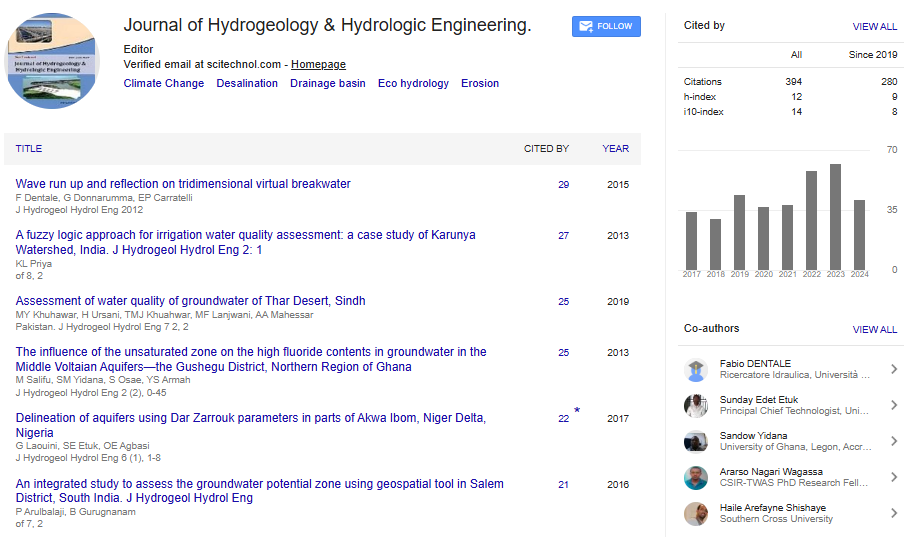Opinion Article, J Hydrogeol Hydrol Eng Vol: 13 Issue: 1
Ecology and Hydrology Together: A Comprehensive Guide to the Sensitive Balance of Water and Life on Earth
Sonam Sherpa*
1Department of Agriculture and Environment, The University of Western Australia, Crawley, Australia
*Corresponding Author: Sonam Sherpa,
Department of Agriculture and
Environment, The University of Western Australia, Crawley, Australia
E-mail: sherpa89@gmail.com
Received date: 22 January, 2024, Manuscript No. JHHE-24-132070;
Editor assigned date: 24 January, 2024, PreQC No. JHHE-24-132070 (PQ);
Reviewed date: 08 February, 2024, QC No. JHHE-24-132070;
Revised date: 16 February, 2024, Manuscript No. JHHE-24-132070 (R);
Published date: 23 February, 2024, DOI: 10.4172/2325-9647.1000307
Citation: Sherpa S (2024) Ecology and Hydrology Together: A Comprehensive Guide to the Sensitive Balance of Water and Life on Earth. J Hydrogeol
Hydrol Eng 13:1.
Description
Hydrology is the study of the movement, distribution, and quality of water on Earth's surface and in the atmosphere. Ecology, on the other hand, is the scientific study of the relationships between living organisms and their environment. However, these two disciplines are intimately connected, as water is an essential component of all life on Earth. Eco-hydrology is an emerging field that aims to understand the intricate interactions between ecosystems and hydrological processes. This comprehensive title will delve into the fascinating land of ecohydrology, exploring the intricate relationships between water, ecosystems, and life on Earth.
Process of ecology and hydrology
The aquatic connectivity of ecosystems: Water is a vital component of all ecosystems, connecting them in complex networks. Freshwater ecosystems, such as rivers, lakes, and wetlands, are the primary sources of water for the majority of the world's population. These ecosystems provide vital ecological services, including water filtration, flood control, and habitat for countless species of plants and animals.
The rhythms of water: Water has a unique ability to cycle through ecosystems, perpetuating life. The hydrological cycle consists of the movement of water between the atmosphere, land, and oceans, regulated by solar energy. This cycle creates a rhythm of water that sustains life on Earth, from the tiniest microorganisms to the mightiest trees.
The groits of plant hydrology: Plants are precarious components of ecosystems, as they play a fundamental role in the hydrological cycle. They absorb water from the soil, release it back into the atmosphere through transpiration, and provide shade that influences the temperature of the surrounding environment. Understanding the hydrological properties of plants is essential for managing ecosystems effectively.
The water-energy-food nexus: Eco-hydrology recognizes the interconnectedness of these essential resources, which are often optimized in isolation. However, this approach neglects the impact of water management on energy and food production, and vice versa. A more holistic approach to resource management acknowledges the intricate relationships between water, energy, and food systems.
The challenges of eco-hydrology in the anthropocene: The Anthropocene, a geological era defined by human activity, presents significant challenges for eco-hydrology. Climate change, agricultural practices, and urbanization have altered the delicate balance of ecosystems, leading to water scarcity, flooding, and pollution. Ecohydrology must adapt to these changes and develop innovative solutions to mitigate their impact.
Eco-hydrology and society: The intricate connections between ecosystems and hydrological processes have significant implications for society. Understanding these relationships can help us develop sustainable water management strategies, protect ecosystems, and promote the well-being of human populations. Eco-hydrology can inform policies on water allocation, infrastructure development, and disaster risk reduction.
The power of eco-hydrology in a changing world: In the face of growing global challenges, eco-hydrology offers a unique opportunity to address water, energy, food, and environmental security simultaneously. By understanding the delicate balance of ecosystems and hydrological processes, we can develop sustainable solutions that foster resilience and adaptability in the face of environmental change.
Conclusion
Eco-hydrology is an exciting field that offers valuable insights into the interconnectedness of ecosystems and hydrological processes. By exploring the intricate relationships between water, energy, food, and the environment, this title has demonstrated the importance of considering the broader context of resource management. By combining the principles of ecology and hydrology, we can develop sustainable solutions that protect the delicate balance of ecosystems and promote the well-being of human populations.
 Spanish
Spanish  Chinese
Chinese  Russian
Russian  German
German  French
French  Japanese
Japanese  Portuguese
Portuguese  Hindi
Hindi 
